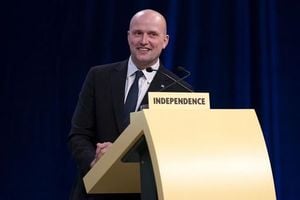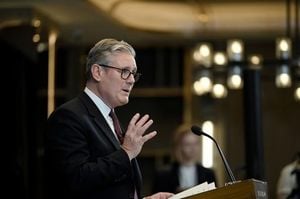In a move that’s turning heads across the Sunshine State and beyond, Fort Myers-based radio station 93.7 WEHL has rebranded itself as “Trump Country 93.7 Make Country Great Again!” The transformation, which took place on September 18, 2025, is more than just a nod to the Trump 2.0 era—it’s a full-throttle embrace of the former president’s persona, his appeal to country music fans, and the ongoing culture wars that define so much of today’s political landscape. The station’s website now greets visitors with an image of Donald Trump donning a neutral-toned cowboy hat, set against a backdrop reminiscent of his campaign’s signature style: a deep blue background emblazoned with bold white and red text.
Beneath the surface, though, the rebrand is more than aesthetic. According to CBS News, WEHL’s programming now leans heavily into the themes and rhetoric of Trump’s political movement, blending classic and modern country hits—from Post Malone and Blake Shelton’s “Pour Me a Drink” to Shania Twain’s “Man! I Feel Like a Woman!”—with pointed on-air promotions and contests that lampoon “woke” culture and celebrate conservative values. The centerpiece of this approach is “The Cancel Bowl,” a weekly contest that invites listeners to call in and report “the most pathetic woke thing you’ve seen in football…or in life.” Winners walk away with prizes like the “Trump Country Tailgate Command Kit”—complete with a flamethrower grill starter, a rack of ribs, a camo cutting board, and flag toothpicks—or even $5,000 in cash, cheekily dubbed the “Freedom Five Thousand,” to be spent on “guns, grills, steaks, ammo, flags, or anything guaranteed to trigger your liberal cousin.”
The station’s promotional material doesn’t shy away from controversy. One pop-up ad features Trump as a referee, his thumb pointed decisively downward, with the tagline: “They canceled team names, the Anthem, even halftime shows…now it’s 4th and WOKE, and we’re calling the plays.” Listeners are encouraged to “throw the flags” on anything they deem excessively progressive, with the promise that the most provocative calls will be aired to “trigger tofu-eaters everywhere.”
But the rebrand goes even further, using a voice actor who impersonates Trump for on-air advertising campaigns. In one recent example, as reported by CBS News, the station launched a “Deportation a Day” campaign, offering cruises to Mexico. The promotion features the Trump impersonator and a young Hispanic male voice actor, with the Trump character referring to trips across the “ ” (a comedic pause), while the Hispanic character clarifies, “the Gulf of Mexico.” The banter is meant to playfully mock the idea of deportations, but it also walks a fine line—one that’s sure to spark debate in a state as politically divided as Florida.
Jim Schwartzel, the president and general manager of WEHL, told CBS News that the station didn’t seek permission for the rebrand. “But I don’t think that the president or anybody else would really be upset by it,” he said, adding, “We looked at it as comedy.” Yet Schwartzel’s ambitions extend beyond radio: he’s currently running for Congress in hopes of succeeding Rep. Byron Donalds (R-FL), who has set his sights on the Florida governor’s mansion.
The station’s bold new identity comes at a time when the intersection of politics, media, and culture has never been more fraught. The Trump Doctrine—particularly its aggressive stance on drug and gun trafficking—has rippled far beyond U.S. borders, influencing not only domestic discourse but also international relations. Just last week, as detailed in a widely circulated commentary, President Donald Trump’s assertion that trafficking deadly drugs into the U.S. constitutes an act of war was put into action when the U.S. military destroyed a suspected drug-trafficking boat coming out of Venezuela. All 11 alleged traffickers aboard were killed, and the move was justified by the administration as a necessary defense against the “war” being waged on American communities.
This hardline approach has inspired leaders elsewhere. In Trinidad and Tobago, Prime Minister Kamla Persad-Bissessar, facing her nation’s highest-ever homicide rate—a crisis fueled in part by weapons smuggled from the U.S., especially South Florida—declared that traffickers should be “violently” killed by military means. According to commentary published last week, Persad-Bissessar’s frustration is hardly unique: three-fourths of the firearms flooding Trinidad and the wider Caribbean originate in the U.S., with South Florida serving as a key pipeline. The Trump administration’s deployment of eight warships and thousands of military personnel into the Caribbean to combat drug-runners has raised the stakes, prompting speculation that Caribbean nations might soon feel justified in taking similarly aggressive action against gun traffickers bound for their shores.
“What, you say? We can’t have foreign militaries blasting ships in our American seas and Cessnas in our American skies? But those South Florida gun mules aren’t just criminals—they’re combatants engaged in warfare,” the commentary mused, highlighting the potential for international escalation if the Trump Doctrine is applied reciprocally.
The crisis isn’t limited to Trinidad. Haiti, whose homicide rate is one-third higher than Trinidad’s, has been ravaged by gangs armed with U.S.-sourced weapons. Just last week, over 40 Haitians were massacred in the fishing village of Labodrie—a tragedy attributed in part to the “tsunami of U.S. and Florida weapons” fueling the violence. Other Caribbean nations, from Jamaica to Barbados to St. Kitts and Nevis, possess small but capable military forces that, in theory, could patrol near U.S. waters to intercept gun-laden boats.
The Trump administration’s policies have also drawn criticism for their impact on international partnerships. For the first time in three decades, Colombia was placed on the U.S. list of nations failing to cooperate in the drug war, a move that comes as coca cultivation rises and leftist President Gustavo Petro advocates for cocaine legalization. Critics argue that U.S. demand for narcotics drives the very violence the administration seeks to quell, while domestic funding for addiction treatment is simultaneously being cut.
Against this backdrop, the emergence of “Trump Country 93.7” feels both timely and emblematic of the broader cultural and political battles playing out in Florida and nationwide. The station’s unapologetic embrace of Trumpian rhetoric, its satirical take on “woke” culture, and its willingness to stoke controversy for entertainment (and perhaps political gain) reflect a media environment where lines between news, advocacy, and comedy are increasingly blurred.
Still, the rebrand has its risks. By aligning so closely with a polarizing political figure and adopting a combative stance on hot-button issues, WEHL may alienate as many listeners as it attracts. But for Schwartzel and his team, that appears to be a gamble worth taking. As the 2026 election cycle looms and Florida’s role as a political bellwether intensifies, “Trump Country 93.7” stands as a vivid example of how the culture wars are being fought on the airwaves as much as in the halls of power.
With the culture, politics, and even international security debates swirling around Florida, the rebranding of a single radio station might seem like a small thing. Yet in today’s America, it’s one more sign of just how deeply—and loudly—the Trump era continues to echo through every corner of public life.




